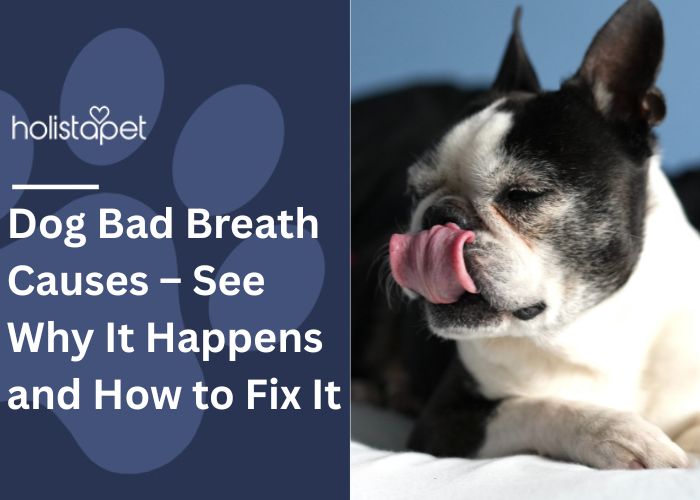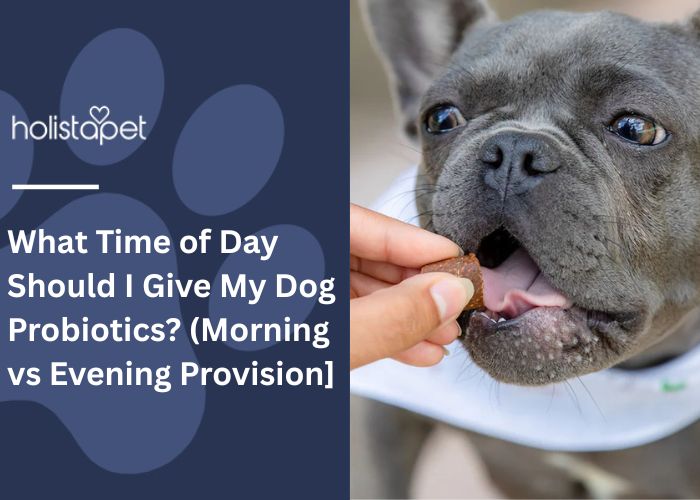Dog bad breath causes more than a funny face when your pup leans in close. A sour or stinky mouth smell often signals oral health issues that you can’t ignore. The best defense is simple daily care: brush their teeth, hand out dental chews, and refresh their water bowls.
Regular vet visits help catch problems before they grow. With consistent attention to your dog’s oral hygiene, you keep their kisses fresher, their mouth cleaner, and their overall health stronger.
What Is Dog Bad Breath?

Dog bad breath, or halitosis, happens when odors linger in your pup’s mouth beyond normal food smells. What causes bad breath in dogs often ties to poor oral hygiene, tartar buildup, or diet choices. Sometimes it signals deeper health issues. That's why early attention is important for your pet’s comfort.
Normal vs. Abnormal Dog Breath
Your dog’s breath may not smell minty, but mild odors that fade with brushing or dental chews are usually normal. These smells often come from food or natural bacteria in the mouth.
Abnormal breath smells stronger and lasts longer. It often links to gum disease, tartar, or even kidney and liver issues. Unusual scents like fruity or ammonia-like odors point to serious problems, and persistent foul smells mean your pup needs veterinary care.
Why Paying Attention to Smelly Breath Matters
Your dog’s breath tells more than you’d expect. Persistent foul smells often mean plaque, tartar, or gum irritation that brushing alone can’t fix, and ignoring them lets hidden infections sneak in.
Strong odors can even flag bigger issues—ammonia-like or fruity scents sometimes signal kidney or metabolic problems. Since these affect vital organs, keeping an eye (or nose) on your pup’s breath helps you act early, ease discomfort, and prevent lasting damage.
Most Common Causes of Bad Breath in Dogs

Why do dogs get bad breath? Often it comes down to three main culprits:
- Plaque and Tartar Buildup: Sticky plaque hardens into tartar, trapping bacteria that release strong odors.
- Gum Disease and Oral Infections: Inflamed gums or infected roots create foul smells and pain.
- Foreign Objects in the Mouth: Sticks, food bits, or debris lodged between teeth rot and irritate gums, worsening your dog's breath smell.
Health Conditions That Cause Bad Breath in Dogs
Sometimes bad breath hints at bigger health concerns. Kidney disease can bring an ammonia-like odor, diabetes may leave a sweet or fruity scent, and liver disease often adds a musty smell.
If breath changes come with appetite loss, thirst, or lethargy, see a vet fast. A professional exam ensures an accurate diagnosis and timely treatment, whether it’s kidney or liver disease.
Diet and Lifestyle-Related Causes of Dog Bad Breath
Diet and lifestyle choices play a big role in your dog’s breath. Low-quality food often leaves lingering odors because it fails to support digestion or promote oral health. Some pups eat garbage or feces, which makes their breath smell foul for days.
Digestive problems, including acid reflux, can also push sour smells into the mouth. Paying attention to what your dog eats helps you prevent stubborn breath odors and keep them feeling better.
When Dog Bad Breath Signals Something Serious
Your dog’s breath may reveal more than poor oral hygiene. Persistent, seriously bad breath can signal underlying health conditions, such as oral tumors, growths, or even respiratory infections. Spotting these changes early helps guard your pup’s overall health.
Oral Tumors or Growths
A commonly overlooked cause of stubborn bad breath is the presence of oral tumors or growths in your dog’s mouth. These often create a strong, rotten odor when tissue bleeds or breaks down. Food often gets trapped around growths, adding to the stench.
Warning signs include lumps, drooling, swelling, or chewing difficulty. Because some tumors can spread, veterinary exams, imaging, and sometimes a biopsy are vital. Early detection and treatment protect your dog’s health, comfort, and quality of life.
Respiratory or Sinus Infections
Bad breath can also stem from respiratory or sinus infections, sometimes complicating existing periodontal disease. When bacteria and mucus build up, they often drip into the throat, creating stubborn odors. Infected tissue adds to the smell, making it stronger than ordinary mouth odors.
Signs include nasal discharge, sneezing, noisy breathing, coughing, or facial swelling. These infections can spread if untreated, so veterinary care is critical. Proper diagnosis and treatment restore comfort while preventing more dangerous complications in your pup.
Related Post: Is Bad Breath in Dogs a Sign of Illness?
Natural Solutions for Dog Bad Breath

You can freshen your dog’s breath with natural approaches that also support oral health:
- Regular Dental Care and Chew Support: Brush often and offer dental chews or toys that scrape plaque.
- Fresh Foods & Herbal Helpers: Crunchy veggies and parsley act as natural fresheners.
- Healthy Oils & Probiotics: Coconut oil supports bacterial balance, while probiotics aid digestion.
- Hydration & Daily Care: Clean water helps wash away food debris and bacteria daily.
Holistapet Products for Dog Bad Breath
You want safe, natural options when tackling stinky dog breath. Holistapet offers products designed to freshen your dog’s mouth while supporting overall wellness. Our blends use clean ingredients, probiotics, and herbs, making them a trusted choice for dog owners.
Fresh Breath Chews for Dogs
Fresh Breath Chews give your pup more than a tasty snack. They fight odor at its source. Each chew blends spirulina, kelp, parsley, peppermint, and coriander to freshen breath naturally. With 300M CFU probiotics from 18 strains, they reduce odor-causing microbes.
The clean formula uses chickpea flour and sweet potato instead of artificial colors or flavors. Give one chew daily, or as needed, to support your pet's oral health. They help reduce plaque and tartar and come with a satisfaction guarantee, plus free shipping and subscription perks.
Fresh Breath Dental Sticks
Fresh Breath Dental Sticks work like a chewable brush. They help your dog fight odors while enjoying a treat. They feature a natural mix of spirulina, kelp, parsley, peppermint, and coriander for fresh breath support. Like our chews, each stick includes 300 million CFU probiotics from 18 strains to reduce odor-causing microbes.
The formula stays clean, with no artificial colors or flavors. It relies on ingredients like chickpea flour and sweet potato. Though not a replacement for brushing, they help reduce plaque and tartar. Your pup gets fresher breath and stronger oral care.
Preventing Bad Breath in Dogs Long Term
Fresh breath for your pup starts with daily habits. Balanced nutrition, steady oral care, and regular vet visits work together to stop odor from building up. They also allow you to catch emerging oral health issues. Consistency keeps your dog’s smile bright and their body healthier overall.
Balanced Nutrition and Daily Care
Balanced nutrition and daily care play a big role in preventing bad breath. A diet rich in quality proteins, fiber, and healthy fats supports digestion and reduces odor-causing bacteria. Clean water keeps saliva flowing, washing away food bits and germs.
Daily brushing, dental chews, and natural helpers like parsley or coconut oil keep your dog’s mouth fresh. Pairing good food with consistent oral hygiene helps protect your dog's teeth, gums, and overall comfort.
Scheduling Regular Vet Checkups
Regular vet checkups catch bad breath problems early. Vets can spot tartar, gum irritation, or loose teeth, and professional cleanings clear buildup that brushing and chews can’t reach. Wellness screenings may also reveal if your dog’s kidneys or liver are in trouble.
While helpful, this does not constitute medical advice—always follow your vet’s guidance. Most dogs do well with yearly visits, but small breeds or seniors may need checkups every six months for healthier mouths.
FAQs – Why Do Dogs Get Bad Breath?
Can dental chews really improve breath?
Yes—dental chews scrape plaque, cut tartar, and freshen breath, especially when paired with brushing and vet care.
How do I know if my pup’s bad breath is serious?
Strong, persistent odors that brushing won’t fix may mean more. Watch for gum swelling, loose teeth, appetite loss, or unusual smells, and get veterinary advice fast.
Can diet changes help with bad breath?
Yes—better food supports digestion and reduces odor-causing bacteria. Skip table scraps, ditch fillers, and try crunchy veggies or probiotics for fresher breath.
What products are safe to freshen dog breath?
Go for natural dental chews, dental sticks, or probiotic blends. Choose clean, plant-based formulas without artificial additives to support your dog’s oral health.
Final Thoughts on Bad Breath Causes in Dogs
A healthy mouth means a happier dog, and fresher breath makes every cuddle more enjoyable. Addressing bad breath early saves your pup from discomfort and serious illness. Daily care, balanced food, and consistent vet visits create lasting benefits.
When you commit to prevention and quick action, your dog gains stronger teeth, better health, and more energy. Fresh kisses then become a sign of love and good care, not a warning of hidden problems.
Click the link to continue browsing Holistapet Dog Care blogs!



 CBD Oil for Dogs - Fast Acting
CBD Oil for Dogs - Fast Acting
 Chicken Flavored CBD Oil For Dogs - Easy Dose
Chicken Flavored CBD Oil For Dogs - Easy Dose
 Salmon Flavored CBD Oil For Dogs - Highly Rated
Salmon Flavored CBD Oil For Dogs - Highly Rated
 CBG Oil for Dogs and Cats - Loved by Thousands
CBG Oil for Dogs and Cats - Loved by Thousands





Leave a comment
All comments are moderated before being published.
This site is protected by hCaptcha and the hCaptcha Privacy Policy and Terms of Service apply.